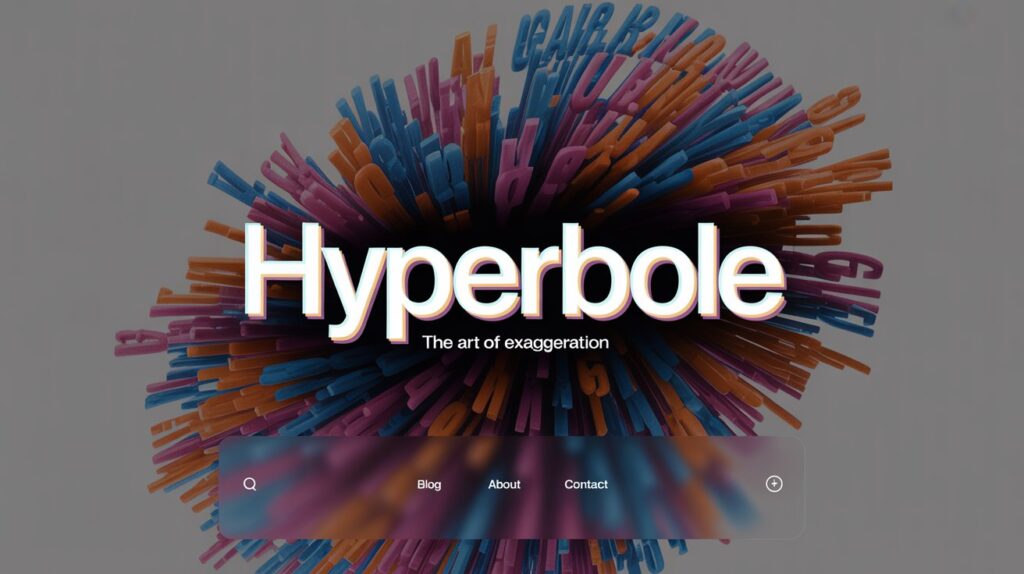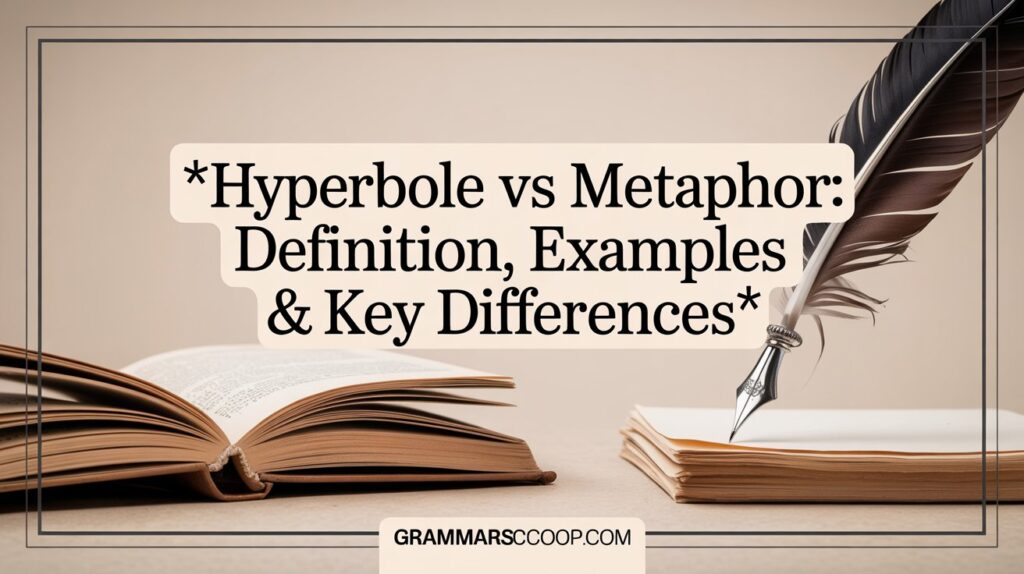Ever heard someone say, “I’m drowning in work” or “He’s a beast on the field”? You’ve just encountered a metaphor. What about, “I’ve told you a million times!” or “That weighs a ton”? Those are hyperboles. In this deep-dive guide, you’ll learn everything you need to know about hyperbole vs metaphor, from definitions to real-life usage, complete with examples, comparison charts, and writing tips.
Whether you’re a student learning figurative language, a writer polishing your craft, or just someone curious about the quirks of English, this article will help you decode these powerful literary devices.
Let’s get into it.
Quick Summary
Understanding the difference between metaphor vs hyperbole is key to mastering figurative language. A metaphor makes a symbolic comparison by saying one thing is another to add depth and clarity, while a hyperbole uses bold, extreme exaggeration to create emphasis or humor. Both are powerful literary devices used in writing, speaking, and storytelling to express emotions, ideas, and vivid imagery. Whether you’re crafting poetry, penning persuasive copy, or analyzing literature, knowing when to use a metaphor versus a hyperbole can elevate your communication and captivate your audience.
Understanding the Basics
What Is a Metaphor?

A metaphor is a figure of speech that describes one thing by stating that it is something else. It’s not meant to be taken literally. Instead, it’s used to draw a strong comparison between two unrelated things, helping the reader understand complex or abstract ideas in a more tangible way.
In short, a metaphor says this is that to explain an idea more vividly.
Metaphor definition: A direct comparison between two unrelated things without using “like” or “as.”
Example: “Time is a thief.”
You’re not saying time is literally sneaking into your house and stealing your belongings. You’re saying time takes things away from you—your moments, your youth—just like a thief would.
Why it works: Metaphors help paint mental pictures, which make writing more engaging and relatable.
What Is Hyperbole?

Hyperbole is all about exaggeration. It takes a statement and blows it up to dramatic proportions—not to lie, but to emphasize.
Hyperbole definition: A figure of speech that uses exaggerated statements for effect, not meant to be taken literally.
Example: “I’m so hungry I could eat a horse.”
Of course, you’re not about to chow down on livestock. But it lets people know—loud and clear—that you’re starving.
Why it works: Hyperboles grab attention. They dramatize situations, often for humor, frustration, or excitement.
Key Differences at a Glance
Let’s break down the differences between these two language techniques side by side:
| Feature | Metaphor | Hyperbole |
|---|---|---|
| Purpose | Compare two unrelated things | Exaggerate to emphasize or entertain |
| Literal meaning | Not literal | Not literal |
| Example | “The world’s a stage.” | “I waited forever.” |
| Tone | Often poetic or symbolic | Often dramatic, humorous, or emotional |
| Used in | Literature, speeches, essays | Advertising, jokes, daily conversation |
| Common clue words | No “like” or “as” | Outlandish numbers or impossibilities |
| Goal | Create vivid imagery | Intensify feelings or reactions |
This quick comparison helps clear up the fog surrounding metaphor vs hyperbole. While both belong to the same family of figurative language, they play very different roles.
Examples That Clarify Everything
Let’s move from theory to real life. Here’s a look at common, punchy, and clever examples of metaphors and examples of hyperboles.
Common Examples of Metaphors
These comparison words aren’t meant to exaggerate. Instead, they reveal insight or deepen understanding.
- “Her voice is music to my ears.”
- “He’s a night owl.”
- “Life is a rollercoaster.”
- “My job is a prison.”
- “That child is a tornado.”
- “Your mind is a sponge.”
Why they work: These metaphors take two unrelated things—like a child and a tornado—and tie them together to make a clear point: the kid is chaotic, energetic, or destructive, just like a whirlwind.
Explore further:
- Feel Or Feal: Don’t Mix Up These Similar Words
- Up to Date or Up-to-Date: Which One Should You Use?
- Arised or Arose: to the Correct Past Tense of Arise
- Acclimate vs. Acclimatize vs. Acclimatise: Guide to Proper Usage
- Quit vs Resign: Clear Up the Confusion Once and For All
Common Examples of Hyperboles
Hyperboles thrive on overstatement. These word tricks aim to surprise or amuse.
- “I’ve called you a thousand times.”
- “I’m dying of embarrassment.”
- “She’s older than the hills.”
- “This suitcase weighs a ton.”
- “He runs faster than the speed of light.”
- “This is the best day ever in the history of the universe.”
Why they work: They paint intense emotional pictures. You’re not literally dying of embarrassment—but we get just how mortified you feel.
When They Overlap (And Why It’s Confusing)
Some phrases seem to sit somewhere between metaphor and hyperbole, which leads to confusion. That’s because both are figures of speech, and they bend literal meanings.
Let’s look at a few examples:
- “He exploded with anger.”
This could be seen as a metaphor (he didn’t literally explode), but the exaggeration could push it toward hyperbole. - “She’s a firecracker.”
Metaphor—comparing her energy or temperament to something loud and dynamic. - “I cried a river.”
Technically hyperbole, but the poetic image feels metaphorical too.
So how do you tell the difference?
Ask yourself:
- Is this phrase exaggerating for effect? → Probably a hyperbole
- Is it equating one thing with another symbolically? → Likely a metaphor
When to Use Each (And How to Choose)
Using these tools well depends on your goal.
Use a Metaphor When You Want To:
- Clarify an abstract idea
- Create deeper emotional resonance
- Enrich narrative or poetic writing
- Elevate your message without overstatement
Great for:
Speeches, storytelling, essays, songs, branding
Use a Hyperbole When You Want To:
- Be playful, sarcastic, or dramatic
- Show emotion in a bold way
- Emphasize urgency, intensity, or volume
- Capture attention quickly
Great for:
Ads, casual conversation, comedy, expressive writing
Writing Decision Table
| Situation | Use Metaphor? | Use Hyperbole? |
|---|---|---|
| Poetry or creative writing | Yes | Yes |
| Persuasive speech | Yes | Yes (sparingly) |
| Academic paper | Yes (formal) | No |
| Marketing copy | Yes | Yes |
| Satirical blog or comedy skit | No | Yes |
| Kids’ book or lesson | Yes | Yes |
Real-Life Applicatios of Hyperbole vs Metaphor
These literary devices aren’t just classroom material. They’re everywhere.
In Literature
Authors rely on metaphors to convey complex themes.
- Shakespeare: “All the world’s a stage.” (Metaphor)
- Charles Dickens: “It was the best of times, it was the worst of times.” (Hyperbole and juxtaposition)
In Pop Culture
Song lyrics, movie lines, and memes are full of both.
- Adele: “There’s a fire starting in my heart.” (Metaphor)
- Taylor Swift: “I remember it all too well.” / “You kept me like a secret, but I kept you like an oath.” (Metaphor)
- Hyperbole meme: “Literally me after one bad text.” (Exaggeration for humor)
In Advertising
- Red Bull: “It gives you wings.” (Metaphor)
- Snickers: “You’re not you when you’re hungry.” (Metaphor with exaggeration)
- M&M’s: “Melts in your mouth, not in your hands.” (Hyperbole to sell product durability)
famous examples of hyperbole in literature
- “I had to wait in the station for ten days—an eternity.” – Heart of Darkness
- “I’ll love you till the ocean is folded and hung up to dry.” – W.H. Auden
Quiz Yourself: Hyperbole Vs Metaphor?
Let’s test your skills. Decide whether each phrase below is a metaphor vs hyperbole.
- “He’s a rock.”
- “I’ve been waiting for centuries.”
- “The classroom was a zoo.”
- “She’s as tall as a skyscraper.”
- “Time flies when you’re having fun.”
Answers:
- Metaphor
- Hyperbole
- Metaphor
- Hyperbole
- Metaphor
Conclusion
Understanding hyperbole vs metaphor isn’t just about grammar. It’s about mastering figurative language to communicate with clarity, power, and emotion. Metaphors add depth. Hyperboles add punch. Use both wisely, and your writing will leap off the page.
Want to sharpen your skills even more? Try creating your own metaphors and hyperboles. The more you use them, the more natural they’ll become.
FAQs About Hyperbole Vs Metaphor
- What is the difference between hyperbole and metaphor?
A metaphor compares two things directly to add meaning. A hyperbole exaggerates something to emphasize it. Metaphor = comparison. Hyperbole = exaggeration.
- What is the difference between a metaphor and a hyperbolic?
“Hyperbolic” is an adjective that describes something exaggerated. A metaphor makes a symbolic comparison. So a hyperbolic statement is full of exaggeration, while a metaphor uses indirect comparison.
- Is ‘it’s raining cats and dogs’ a metaphor or hyperbole?
It’s a common idiom, not strictly a metaphor or hyperbole. But if you had to choose, it leans toward hyperbole because of the exaggerated imagery.
- How to tell if it’s a metaphor or hyperbole?
If it’s a symbolic comparison—it’s a metaphor. If it’s an over-the-top exaggeration—it’s hyperbole.
- What is the purpose of using metaphor and hyperbole in writing?
They make writing vivid, engaging, and emotionally charged. Readers remember powerful language—and these tools deliver just that.

Lisa Morris is a seasoned blogger and language enthusiast with a passion for making grammar simple and engaging. At Grammar Scoop, she shares clear, concise tips that help readers master the rules of English with confidence.






